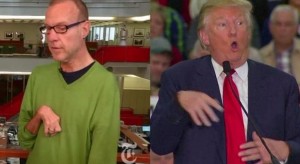 Washington, D.C., March 21 – Some Rabbis and other Jewish Americans are protesting Republican front-runner Donald Trump’s lack of inclusion for minorities, including people with disabilities, ahead of his scheduled speech to the AIPAC Policy Conference this evening.
Washington, D.C., March 21 – Some Rabbis and other Jewish Americans are protesting Republican front-runner Donald Trump’s lack of inclusion for minorities, including people with disabilities, ahead of his scheduled speech to the AIPAC Policy Conference this evening.
While many of AIPAC’s delegates who oppose Trump speaking tonight are upset with the businessman’s violent rhetoric on groups like Muslims and Mexicans, the Republican front-runner also has verbally attacked individuals with disabilities, expanding stigmas that have been undermining people with disabilities for ages.
Rabbi Rick Jacobs, president of the Union for Reform Judaism, has expressed his concern about Trump’s level of intolerance for several groups including individuals with disabilities.
“We will hold him accountable to all of the groups that he is not just disrespecting but denigrating in his speeches and his policy commitments,” Jacobs said Monday morning. “It is unacceptable in America and it is unacceptable according to our Jewish tradition.”
According to both the U.S. Census Bureau and the Centers for Disease Control and Prevention, fully one in five Americans – that’s 56 million Americans – has a disability. A disability is a physical or mental impairment that substantially limits one or more of the major life activities of an individual. People with disabilities are the largest minority group in America. We also are the only minority group that anyone, due to accident or illness, can join at any time.
Former Secretary of State Hillary Clinton, Sen. Ted Cruz and Gov. John Kasich also are scheduled to speak at AIPAC today.
RespectAbility has asked all of the presidential hopefuls to complete the #PwDsVote 2016 Campaign Questionnaire, which was designed for people with disabilities (PwDs) and those who love them to know where candidates stand on the issues. The questionnaire asked all of the presidential candidates on both sides of the aisle to comment on 16 disability questions.
Of the candidates scheduled to address AIPAC today, former Secretary of State Hillary Clinton responded by addressing all of the questions and Ohio Gov. John Kasich filled out parts of the questionnaire. They each have significantly different views on the issues. Despite numerous requests in person and by phone and email, the campaigns of Cruz and Trump have not yet filled out the questionnaire.
Sen. Bernie Sanders, who said his campaigning schedule did not permit him to travel to address AIPAC, also completed the questionnaire.
AIPAC Improves its Inclusion Efforts for People with Disabilities
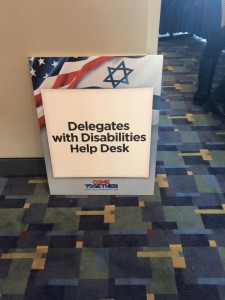
As all large organizations know, it is much easier to say you will be inclusive than to actually become inclusive. During the past two years, AIPAC has made huge strides in this arena.
Two years ago, the policy conference lacked both captioning and sign language interpreters for people who are hard of hearing. RespectAbility raised the issue in the New York Jewish Week, and last year, AIPAC had live captions during the main plenaries.
However, this year, as the largest Jewish gathering in the United States welcomes the presidential candidates – including Trump – to speak to its 18,000 delegates, the conference is lacking live captioning – both in person and on the official Jewish Life TV live stream for thousands of people watching from home.
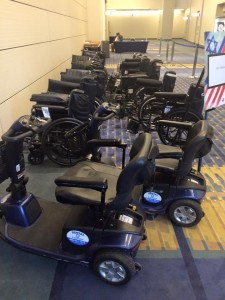
There are noticeable improvements in other areas of inclusion that must be commended. The conference has a help desk and brochure of services for “delegates with disabilities” seeking accessibility services in both locations – the Walter E. Washington Convention Center and the Verizon Center – are ADA accessible. Wheelchairs and scooters are available at the Convention Center’s help desk – but not in the Verizon Center where the major speeches take place. In addition, people can pick up listening devices from the help desk or sit in a special section available in each location for people who are deaf or hard of hearing with an ASL interpreter.
However, for Naomi Adler, the Jewish Federation of Philadelphia’s CEO, that is not enough. During Sunday night’s opening session, she tweeted out her dismay at the lack of captioning.
#AIPAC2016 — why aren’t you using closed captioning in the plenary??? @Respect_Ability, please reach out to help us fix this!
— Naomi Adler (@nladler) March 20, 2016
“As someone who just witnessed a wonderful session on Israel innovation by a company transforming disability access, I am very distressed that those who cannot hear all of the wonderful presentations are not seeing captions at the #AIPAC2016 plenary sessions,” Adler followed up Monday morning. “Providing a sign language interpreter is NOT enough. The most inclusive way to address this issue is to use captioning and I call upon the leadership of AIPAC to rectify this situation immediately!”
Jennifer Laszlo Mizrahi, president of RespectAbility, added, “People with disabilities should not have to sit in a segregated section when it is not needed. However, the conference showcases many efforts of inclusion that we should all be very proud of.”
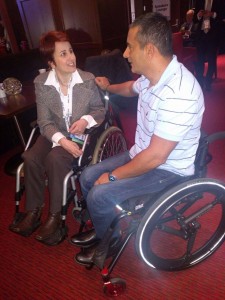
Early Monday morning, AIPAC highlighted two Israeli companies offering innovations for people with disabilities – Softwheels’ acrobat wheel for wheelchairs and Tikkun Olam Makers (TOM) by the Reut Group, a community with goal of developing affordable assistive technology for people with disabilities.
“It is fantastic that in front of 18,000 people, AIPAC put disability inclusion on the stage front and center,” Mizrahi said. “AIPAC is really using its place as a role model to showcase innovations like Softwheels and TOM in a wonderful way.”
While TOM’s featured products were innovative and will help people with disabilities around the world, the video only included captions when the speaker was speaking in Hebrew. By including captions throughout the entire video, AIPAC would have been much more inclusive.
TOM, as well as several other Israeli innovative companies creating technologies for people with disabilities, is featured in AIPAC Village, a gathering area in the convention center for all of the delegates. Delegate can experience how these technologies work first-hand and meet people on the front lines of creating these technologies.
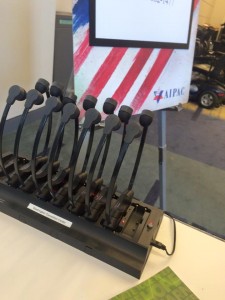
With 18,000 pro-Israel Americans from all 50 states – including 4,000 college students – attending this year’s policy conference, AIPAC has the opportunity and the responsibility to lead by example.
“The Jewish community is a stronger community when it lives up to our values – when we are welcoming, diverse, moral, and respect each other,” Mizrahi said. “AIPAC’s inclusion is not perfect, but it has improved greatly. Because of its large size, the conference battles unique accessibility issues and the inability of the shuttle busses between the two venues to accommodate people with disabilities needs to be addressed. By doing so – and ensuring that live captions are included on both the in-person and live-stream videos, AIPAC can serve as a role model in shaping opinion and policies for years to come.”
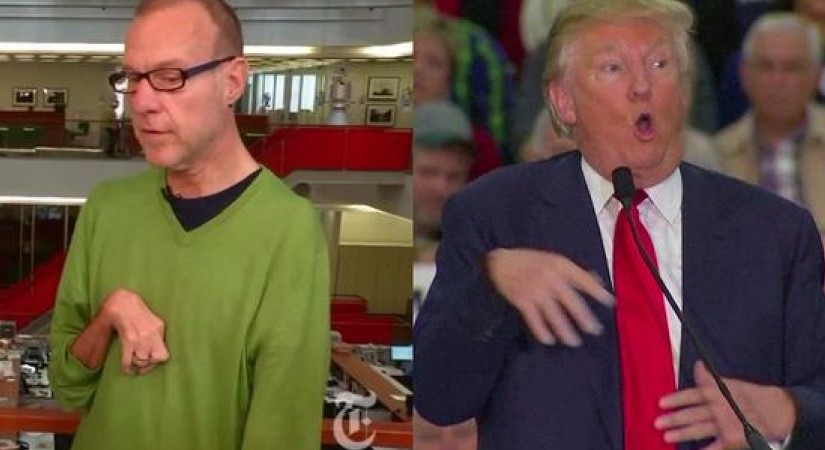
Be First to Comment